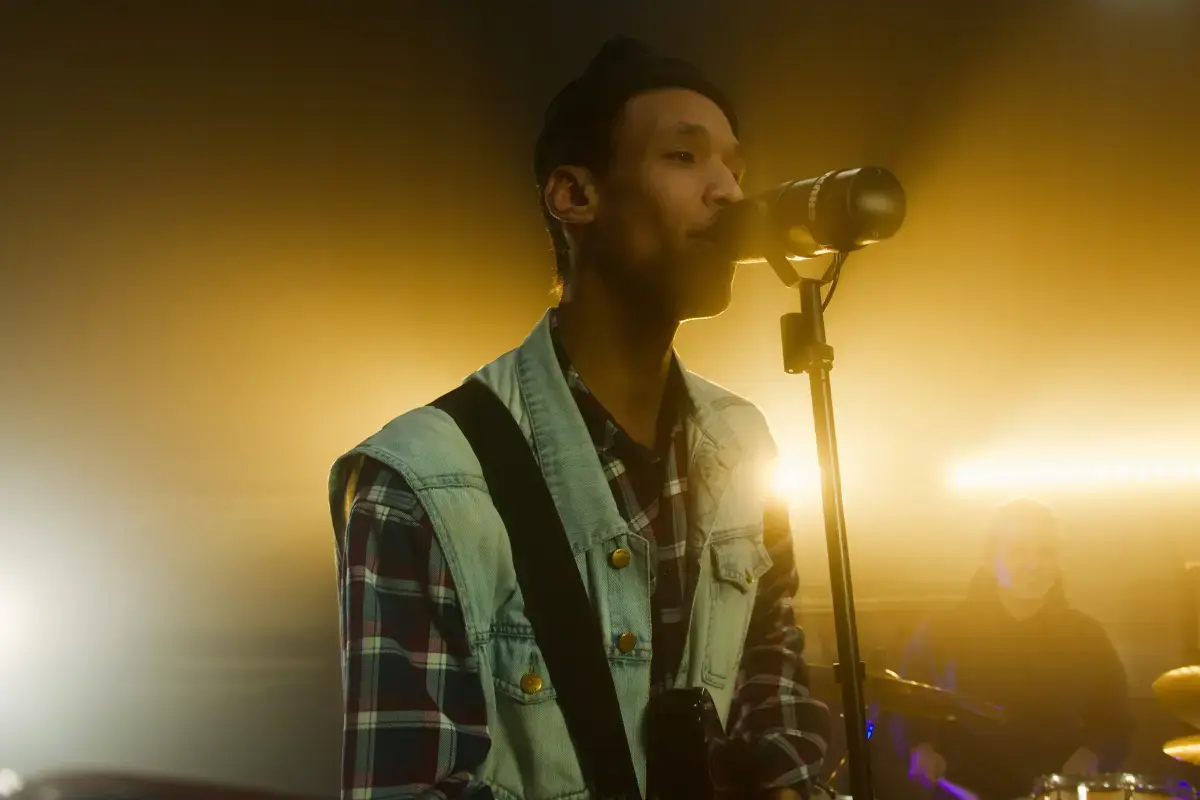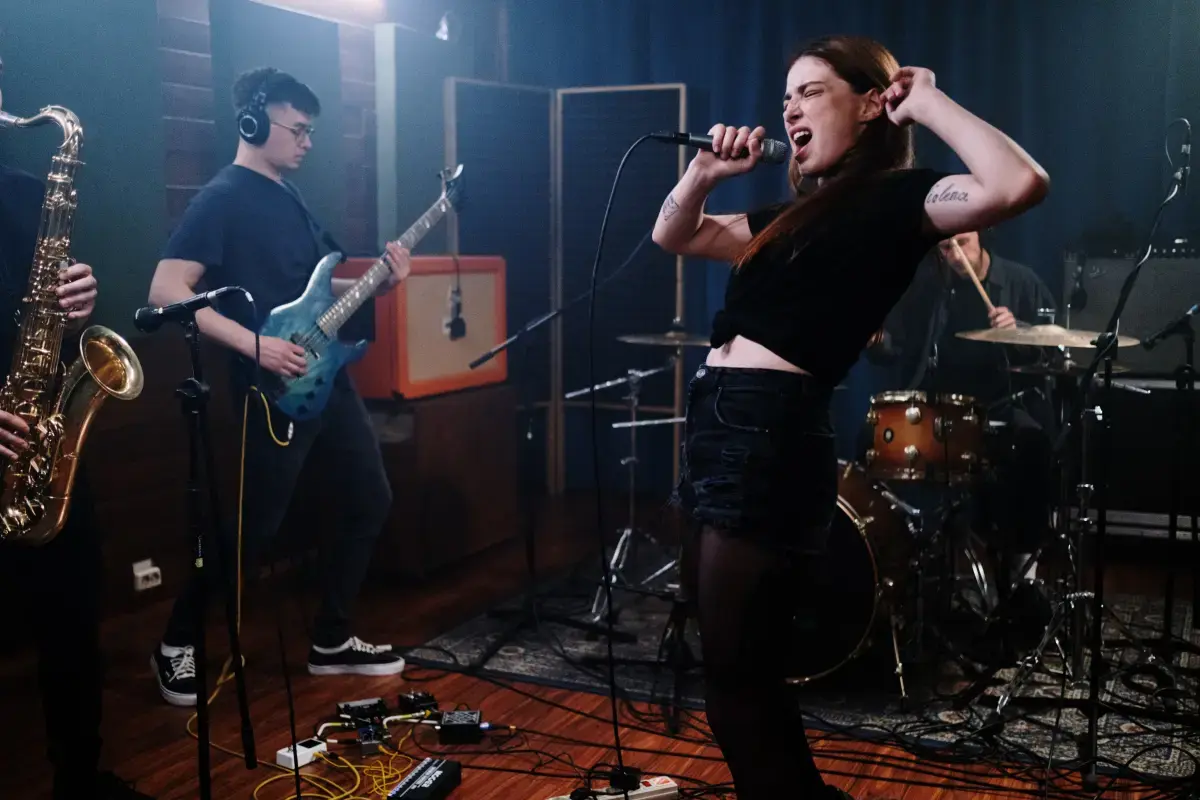
Singer Job Description
What is a Singer Professional?
A singer is someone who uses their voice to create music. This can be done either through singing alone, or by singing with other instruments. Singers often use their voices to express emotions and convey messages through song. Most singers start out by taking singing lessons to learn the basics of vocal technique. They may also join a choir or other vocal group to get experience performing in front of an audience. As they develop their skills, singers may begin writing their own songs or composing music for themselves or others.

What does a Singer Expert do?
Singers typically perform in a wide variety of settings, including concert halls, clubs, festivals, and studios. They may also go on tour with bands or other artists, or perform as soloists at weddings, funerals, and other special events. Some singers also work as session musicians, recording backing vocals or playing instruments on tracks for other artists.

What are the Skills of a Singer?
There is no one answer to this question, as the skills and experience needed by a singer will vary depending on the specific singing style(s) they wish to pursue. However, there are some general skills and experience that all singers should have, regardless of genre. These include: - Strong vocal technique. This includes having a good understanding of vocal anatomy and how the voice works, as well as being able to control the voice through proper breath support and use of the vocal cords.

What makes an Expert Singer?
A strong vocal technique will allow a singer to sing with power, without strain or damage to the voice. - Good pitch control. This refers to a singer’s ability to accurately hit notes within their range without wavering off-key. Good pitch control requires good ear training and a lot of practice. - The ability to convey emotion through song. A great singer is not only able to execute technically perfect vocal runs or sustain long notes – they are also able connect with their audience emotionally, and convey the feeling behind a song through their performance.

What level of Experience & Qualifications are required to be a Singer?
Industry Experience: 1. Substantial performance experience in a professional setting, such as on stage or in the recording studio. 2. Exposure to different types of music genres and styles and ability to adapt quickly. 3. Understanding of music theory and how it relates to singing techniques in order to perform with accuracy, precision, and emotion. 4. Familiarity with audio technology and equipment used for live performances or recordings (microphones, mixers). 5. Knowledge of marketing strategies that can help promote your career as an artist/singer (social media platforms, booking agents). Training: 1. Private vocal lessons from experienced teachers who specialize in specific techniques for singers such as breathing exercises, pitch control & belting techniques etc.. 2 . Participating in workshops or master classes hosted by experts in the field of singing/performing arts; attending conferences related to the industry will also provide valuable knowledge & skills needed to be successful as a singer/artist 3 . Practicing regularly with other musicians so you can stay sharp & develop critical listening skills which are essential when performing live shows Qualifications: 1 . Possessing a degree or diploma related to music performance is highly recommended but not mandatory depending on what type of singing you want pursue (classical vs popular) 2 . Obtaining certifications within certain areas like voice coaching & sound engineering may be beneficial if you plan on teaching others how-to sing professionally 3 . Becoming registered under organizations like ASCAP or BMI will give recognition from peers & industry professionals alike Education: 1 . Completing courses related specifically towards understanding dynamics within vocal production; this includes learning about proper microphone technique , harmonies ,orchestral accompaniment etc.. 2 . Attending seminars given by renowned professionals that have made their mark within the industry ; these sessions usually focus on topics ranging from songwriting tips , networking advice etc… 3 . Studying various artists’ work throughout history that have had an impactful influence on modern day pop culture ; watching documentaries discussing famous singers’ careers can provide insights into creative ways they achieved success

What is the Salary of a Singer?
The salary of a singer can vary greatly depending on factors such as experience, type of singing engagements, and the size and scope of their performances. At the junior level, singers typically earn around $20 to $50 per hour for performing at small venues or private events. As they gain more experience and begin to perform in larger venues with bigger audiences, their hourly rate may increase up to $75 per hour. Senior-level singers may be able to command much higher rates based on their reputation and demand for their services. For example, popular recording artists can easily make six figures or more from live shows alone. Additionally, experienced studio session singers are often paid by the track; these sessions usually range between $100-$300 per song depending on complexity and duration.

What are the Working Conditions for a Singer?
General working conditions for a singer can vary, depending on the type of singing they do and the size of their performance. Generally speaking, singers will be expected to show up at performances on time and ready to perform. They may need to rehearse with band members or other performers before shows. They should also be able to work in different settings including small venues, large arenas and outdoor events. In terms of hours worked, singers typically have long days that involve travel as well as rehearsal and performance times. During tours or extended performances, they may spend several days away from home while performing multiple shows per day in various locations around the country or world. Singers must also be mentally prepared since they will often have very little sleep between shows due to tight schedules and travel requirements. Singer’s salaries depend largely upon experience level, how famous they are in their genre of music and how many people attend their gigs/concerts/shows etc., but it is not uncommon for them to earn hundreds or thousands of dollars per gig depending on these factors (and more). Furthermore, some singers receive royalties based off album sales which can add additional income over time if an artist has built a following who consistently purchase new albums released by said artist(s).

What are the roles and responsibilities of a Singer?
Singers must be able to sing on pitch.
Singers must have good breath support and control.
Singers should be able to use their voices in a variety of ways (e.g., for different styles of music).
Singers should be articulate and clear when speaking to audiences.
Singers need to be able to read music or follow a lead sheet.
Rehearsing with bandmates or other musicians is often required for singers.
:Performances may require singing solo, as part of a duet/trio, in a small ensemble, or with a large group/chorus/orchestra.)
:Scheduling performances and rehearsals, as well as promoting oneself and one’s work, are all important parts of being a singer.
:When performing, singers need to project their voices so they can be heard by the audience; they also need to control their dynamics (loudness) appropriately..
:Additionally, many singers also play an instrument onstage (e.g., guitar, piano), which adds another layer of complexity to their performance..
:It is important for singers to take care of their voices by drinking plenty of water and avoiding foods that might damage or irritate their vocal cords..
:Some singers also warm up their voices before singing by doing exercises such as scales or tongue-twisters..
:In order to get gigs, many singers audition for roles in musicals or bands..
:There is often competition for singing jobs, so it is important for singers to stand out from the crowd..
::Singing teachers can help individuals learn how

Where can I find Singer jobs?
- Create a profile on gigexchange and promote your Singer skills to advertise you are Open to New Work Opportunities
- Ensure your Resume (or CV), or online work profile is up to date and represents your skills and experience. Ensure your reputation reflects your ability & attitude.
- Apply for Singer Jobs advertised on gigexchange.
- Practise Singer interview techniques to ensure you represent your personality and ability succinctly and confidently.
- Accept the job offer if the salary meets your expectations and the employer mission and purpose reflects your core values.
Jobs
What are the best job boards for Songster jobs?

How can I hire Singer staff online for my business?
The best job board for recruiting Singer experts is gigexchange.com. Advertise full-time, part-time or contract jobs to find, hire & recruit trusted, experienced and talented Singer candidates near you.

Are Singer roles in demand in 2026?
Singer experts are still in high demand in 2026. If you are an experienced Singer or looking to train and become one. The job market is looking strong for Singer jobs near me.